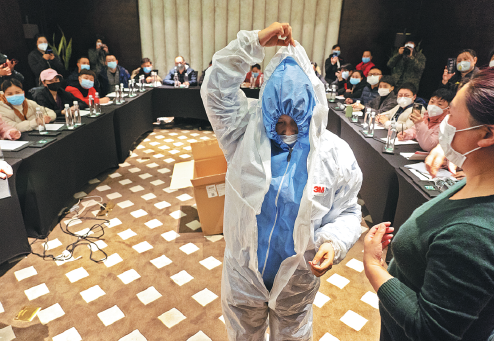Private hospitals join the fight in Wuhan
By Zhou Wenting | CHINA DAILY | Updated: 2020-03-11 09:05

Medical professionals from non-State institutions are providing relief for exhausted teams in Hubei province. Zhou Wenting reports from Shanghai
Qiao Shaoting, a nurse from Hohhot, capital of the Inner Mongolia autonomous region in North China, practiced every step of putting on and taking off protective medical clothing with a colleague. The two women stood face-to-face, surrounded by several colleagues who observed and corrected possible errors.
"Remove the first layer of the protective suit along with the first layer of disposable gloves, and then wash your hands. Remove the second layer of the suit and gloves, and then wash your hands. Take off the face mask, and then wash your hands," the 24-year-old recited the moves as she performed each step.
"We learned these procedures in nursing school, but that was years ago. Most of us don't wear these suits in our daily work in hospitals, so we needed to practice," said Qiao, who works for Meinian OneHealth Healthcare Group, a private medical services provider.
Qiao was speaking on Feb 19 at a hotel near Shanghai Hongqiao International Airport.
The following day, she was part of a 200-strong team that flew to Wuhan, capital of Hubei province, to provide support for medical staff in the city, the epicenter of the novel coronavirus outbreak.
The 40 doctors and 160 nurses-the first team of such size from a private medical institution to win approval from the National Health Commission-were dispatched to two makeshift hospitals and nine medical quarantine sites in the city that are providing treatment to patients with mild symptoms.
"We've seen that the battle in Wuhan has reached a critical stage and as medical workers we feel obliged to rush to the front line as the country confronts this contagion, irrespective of whether we come from State or private hospitals," said Zhai Xiaoqing, medical director of Meinian OneHealth, who is leading the team.
She added that some team members participated in the fight against the outbreak of severe acute respiratory syndrome in China in 2003.
"We have advantages, as we have 30,000 doctors and nurses in more than 700 branches throughout the country. Also, we are one of the leading players in preventive medicine, making our doctors and nurses in the fields of respiratory care and radiology suitable for the work in makeshift hospitals and quarantine sites," she said.























